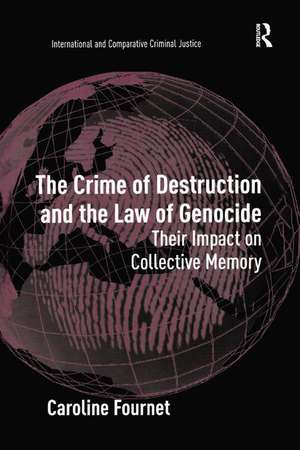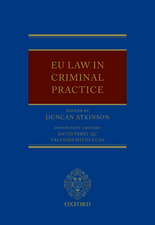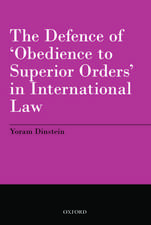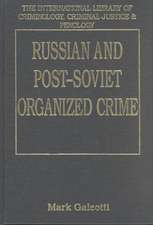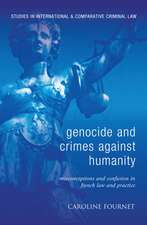The Crime of Destruction and the Law of Genocide: Their Impact on Collective Memory: International and Comparative Criminal Justice
Autor Caroline Fourneten Limba Engleză Paperback – 9 oct 2017
| Toate formatele și edițiile | Preț | Express |
|---|---|---|
| Paperback (1) | 299.52 lei 6-8 săpt. | |
| Taylor & Francis – 9 oct 2017 | 299.52 lei 6-8 săpt. | |
| Hardback (1) | 819.90 lei 6-8 săpt. | |
| Taylor & Francis – 28 mai 2007 | 819.90 lei 6-8 săpt. |
Preț: 299.52 lei
Preț vechi: 341.55 lei
-12% Nou
Puncte Express: 449
Preț estimativ în valută:
57.34€ • 59.00$ • 48.33£
57.34€ • 59.00$ • 48.33£
Carte tipărită la comandă
Livrare economică 01-15 martie
Preluare comenzi: 021 569.72.76
Specificații
ISBN-13: 9781138254152
ISBN-10: 1138254150
Pagini: 216
Dimensiuni: 156 x 234 x 19 mm
Greutate: 0.45 kg
Ediția:1
Editura: Taylor & Francis
Colecția Routledge
Seria International and Comparative Criminal Justice
Locul publicării:Oxford, United Kingdom
ISBN-10: 1138254150
Pagini: 216
Dimensiuni: 156 x 234 x 19 mm
Greutate: 0.45 kg
Ediția:1
Editura: Taylor & Francis
Colecția Routledge
Seria International and Comparative Criminal Justice
Locul publicării:Oxford, United Kingdom
Cuprins
Contents: Introduction: memory and genocide. Part I Specificity and Uniqueness of Genocides: The crime of genocide: 'A crime without a name'?; Dehumanizing intent and death by destruction. Part II The Conventional Interpretation of the Specificity of the Crime of Genocide: The Restrictive Approach of the Genocide Convention: The conventional approach to the genocidal pattern of conduct: the omission of dehumanization; The conventional selective protection of groups: the omission of 'racialization'; The conventional approach to genocidal intent; The genocidal state; The conventional omission of genocide denial; The conventional restrictive approach and the jus cogens prohibition of genocide. Part III Consequences of the Conventional Restrictive Approach to the Crime of Genocide: The Inapplicability of the Genocide Convention and Its Impact on Collective Memory of the Crime: The symptoms of the inapplicability of the genocide convention: the lack of state practice; Legal memory: its impact on social and collective memory of the crime and as a tool against denial; Conclusion: forgiving the unforgivable?; Bibliography; Index.
Notă biografică
Caroline Fournet is Lecturer in Law at the University of Exeter, UK. Her interests are in the areas of Public International Law, especially International Human Rights Law, Humanitarian Law, and International Criminal Law.
Recenzii
'Genocide still features on today's front pages. This book offers intriguing insights into our collective failures of imagination and practice in preventing and punishing mass atrocity. It will be of interest to lawyers and policy makers, and to all who seek to understand the origins of our tragic institutional shortcomings and our moral debt to the memory of the victims.' David Fraser, Professor of Law and Social Theory, University of Nottingham
Descriere
This work deals with the crime of genocide and with the social and collective memory of this crime. The volume shows that genocide fails to be adequately remembered due to the inherent defects of the law of genocide itself. The book thus links the social phenomenon to the legal theory (the legal norms) as well as to the legal practice (the trials).
